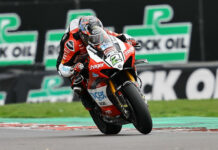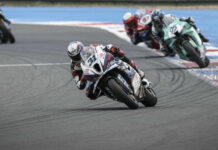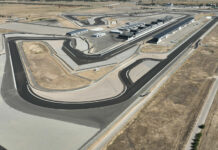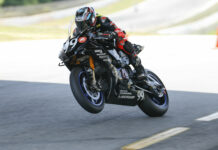This weekend’s Gran Premi Monster Energy de Catalunya marks the 65th anniversary of the first event that counted towards the motorcycle World Championship classification – at the 1949 Isle of Man TT races.
The World Championship series was established by the FIM (Fédération Internationale de Motocyclisme) and is now into its 66th year – the oldest motorsports championship in the world.
The Isle of Man TT races were first established as a non-championship event in 1907, and as part of the event on Monday 13th June 1949 the very first race which counted towards the World Championship took place, a 350cc contest won by British rider Freddie Frith riding a Velocette. The other categories that were included in the first TT event in 1949 were the 250cc & 500cc classes, categories which have now evolved into the modern Moto2™ and MotoGP™ World Championships.
British manufacturers such as AJS and Norton enjoyed success in the early days of the World Championship, before the Italian manufacturers Mondial, Moto Guzzi, Gilera and MV Agusta began to dominate during the 1950s, reflecting the strength of the country’s motorcycle industry at the time. MV Agusta were particularly prolific late in the decade, taking a clean sweep of World titles across all four categories for three seasons from 1958 to 1960 – while their dominance in the 500cc class was unbroken for 17 years from 1958 until 1974.
The most successful rider during the years 1949 to 1976 when the TT was still part of the World Championship series was Mike Hailwood, who took 12 TT victories, including winning the 125cc, 250cc & 500cc class in 1961 to become the first rider to win three different classes at a single World Championship event.
During the 1960s many of the Japanese manufacturers that participate in modern day MotoGP™ racing, such as Honda and Yamaha, arrived to pick up their first World Championship title wins across the 125 and 250 categories, as they announced themselves in Grand Prix racing. Suzuki in particular enjoyed great success in a new 50cc class which was introduced in 1962.
The late 1960s brought the start of the glory days for MotoGP™ Legend Giacomo Agostini – the most successful rider in the history of World Championship competition. Up until the modern era riders regularly competed in two or three classes simultaneously and Agostini took 10 of his 15 titles in five successive seasons as double champion in 350cc and 500cc – in a golden period commencing in 1968, riding for MV Agusta.
After a break of almost 12 years from racing, Honda rejoined the World Championships in the late 1970s and by 1983 they had changed their philosophy from using 4-stroke machinery to build the V3 500 2-stroke, known as the NS500, on which Freddie Spencer took the 500cc World title.
The previous season racing in the 350cc class had been brought to a conclusion after 34 years of competition, leaving four classes in the World Championship – 50cc, 125cc, 250cc and 500cc – with 50cc subsequently replaced by a short lived 80cc category.
The 1980s and 1990s saw some superb quality racing in the premier class in particular with fierce competition between Honda, Suzuki and Yamaha and some great battles between American stars such as Eddie Lawson, Randy Mamola, Freddie Spencer, Wayne Rainey and Kevin Schwantz.
In the late 1990s the 500cc class was utterly dominated by Honda hero and MotoGP™ Legend Mick Doohan who took five consecutive titles, before a combination of racing injuries brought the Australian’s career to a premature end in 1999.
Before the revision of regulations which brought about the move to 990cc 4-stroke competition in the premier class – a young Italian rider called Valentino Rossi took the last ever 500cc title in 2001 on Honda machinery, having won the 1997 edition of the 125cc championship and the 1999 quarter litre crown with Aprilia.
After the re-branding of the World Championship as MotoGP™ in 2002 and the introduction of 990cc racing, Rossi went on to win four further consecutive titles, two with Honda and two after a sensational move to Yamaha.
At the start of the 2007 season, new rules restricting the number of tyres used on Grand Prix weekends and a reduction in engine size from 990cc to 800cc again levelled the playing field in MotoGP™ – with Bridgestone-equipped Ducati rider Casey Stoner emerging as the first standout rider of the new era, as the runaway 2007 World Champion. In 2008, however, Rossi returned to the pinnacle, taking his sixth premier class title, with Stoner a distant runner-up in the standings.
The 2009 season saw the introduction of a single-tyre rule, as Bridgestone were named the sole suppliers for the MotoGP™ class. Rossi took his seventh title in the premier class after a battle with team-mate Jorge Lorenzo, taking him to within one more of equaling Agostini’s all-time record of eight.
In recent years Grand Prix racing has been further modernised with the introduction of the Moto2™ (600cc 4-stroke) and Moto3™ (250cc four-stroke, one cylinder) classes in place of the former 250 and 125 classes.
In 2012 as the premier class grid switched to the 1000cc machines it was Yamaha Factory Racing’s Lorenzo that took the title again. The current MotoGP World Champion is Repsol Honda Team’s Marc Marquez, who in 2013 claimed his first premier-class title in his rookie season, breaking numerous records along the way, including that of becoming the youngest ever premier class World title winner.






